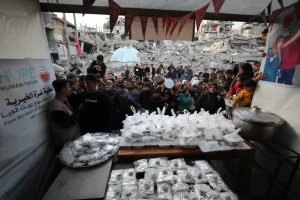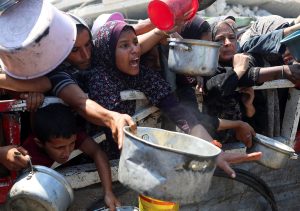Global Aid to Gaza: The ongoing crisis in Gaza has drawn global attention, with countless organizations, governments, and individuals rallying to provide aid. Among the most prominent forms of assistance is the delivery of humanitarian support, often highlighted as a beacon of goodwill. However, beneath the surface of these efforts lies a complex and troubling reality.
Global Aid to Gaza: The Humanitarian Narrative and Its Appeal
The image of aid convoys delivering food, water, and medical supplies to Gaza is powerful. It resonates with the global public’s desire to alleviate suffering and uphold human dignity.
Governments and organizations frequently publicize their efforts in Global Aid to Gaza, showcasing images of aid workers distributing packages to desperate families.
These campaigns generate sympathy and donations, reinforcing the narrative that the international community is actively engaged in resolving the crisis.
Yet, this focus on immediate relief often overshadows the broader context of the conflict, including the blockade, military operations, and systemic restrictions that perpetuate Gaza’s humanitarian disaster.
The emphasis on Global Aid to Gaza creates a feel-good story that is easy to sell to the public.
It allows governments and organizations to appear proactive without confronting the political and military complexities of the situation.
For instance, food aid is tangible, measurable, and photogenic—qualities that make it an ideal tool for public relations.
However, critics argue that this focus serves as a distraction, diverting attention from the need for accountability and justice in addressing the root causes of Gaza’s plight. you can read more about this topic here.
The Scale of the Crisis in Gaza
To understand why Global Aid to Gaza alone is insufficient, one must first grasp the scale of the crisis.
Gaza, a densely populated strip of land home to over two million people, has been under a blockade since 2007, severely restricting the flow of goods, services, and people.
The region has faced multiple military operations, resulting in thousands of civilian deaths, widespread destruction of infrastructure, and a humanitarian catastrophe.
Reports from organizations like the United Nations and Amnesty International have documented severe shortages of food, clean water, and medical supplies, alongside allegations of deliberate targeting of civilian infrastructure.
The term “genocide” has been increasingly used by activists, scholars, and some international bodies to describe the situation in Gaza.
The systematic nature of the violence, including airstrikes, restrictions on movement, and the destruction of hospitals and schools, has led to accusations that the international community is complicit in allowing these atrocities to continue.
While Global Aid to Gaza addresses immediate hunger, it does little to stop the bombings, lift the blockade, or rebuild the shattered infrastructure that sustains life in the region.
The Limits of Food Aid
The act of Global Aid to Gaza is undeniably critical in preventing starvation and addressing immediate needs. However, it is a temporary fix that fails to tackle the structural issues at the heart of the crisis. Food aid, no matter how well-intentioned, cannot replace the need for systemic change.
For example, the blockade restricts the import of essential goods, making it difficult for aid organizations to deliver sufficient quantities of food. Even when food reaches Gaza, distribution is hampered by damaged infrastructure, insecurity, and bureaucratic obstacles imposed by conflicting parties.
Moreover, food aid often comes with political strings attached. Donor countries and organizations may use Global Aid to Gaza as a tool to advance their geopolitical agendas, rather than as a genuine effort to alleviate suffering.
For instance, aid may be tied to conditions that reinforce the status quo, such as compliance with certain political or military demands.
This politicization of aid undermines its effectiveness and perpetuates the cycle of dependency and suffering.
Performative Humanitarianism
The concept of performative humanitarianism is central to understanding why Global Aid to Gaza is often criticized as a form of deception.
Performative humanitarianism refers to actions that prioritize optics over substance, creating the illusion of meaningful intervention while avoiding the harder work of addressing systemic issues.
By focusing on Global Aid to Gaza, governments and organizations can project an image of compassion without confronting the political realities that perpetuate the crisis.
For example, high-profile aid campaigns often dominate headlines, with leaders pledging millions in humanitarian assistance.
These pledges are frequently accompanied by images of aid trucks or smiling children receiving food packages. Yet, these efforts rarely translate into long-term solutions.
The same governments that champion food aid may simultaneously support policies that sustain the blockade or fund military operations in the region, creating a paradoxical situation where aid serves as a Band-Aid for wounds they help inflict.
The Call for Accountability
If the international community is serious about helping Gaza, it must move beyond Global Aid to Gaza and address the root causes of the crisis.
This includes demanding accountability for alleged war crimes, lifting the blockade, and supporting reconstruction efforts that empower Gazans to rebuild their lives.
The focus on food aid, while necessary, risks becoming a distraction from these larger issues. Without addressing the systemic violence and restrictions, aid efforts will continue to fall short, leaving Gazans trapped in a cycle of poverty and despair.
Activists and human rights organizations have called for stronger international action, including sanctions on those responsible for the violence and increased pressure to end the blockade.
The International Criminal Court (ICC) has faced calls to investigate allegations of genocide and war crimes in Gaza, yet progress has been slow.
The international community’s reluctance to take decisive action suggests that Global Aid to Gaza is, in many cases, a substitute for confronting uncomfortable political truths.
The Role of Public Awareness
Raising public awareness is critical to shifting the narrative from performative aid to meaningful action. The global public has a role to play in holding governments and organizations accountable for their actions—or lack thereof—in Gaza.
Social media platforms like X have become powerful tools for amplifying the voices of Gazans and their supporters, shedding light on the realities of the crisis.
By sharing stories, images, and firsthand accounts, activists can challenge the sanitized narrative of Global Aid to Gaza and highlight the need for systemic change.
Public pressure can also influence policy. Grassroots movements, such as the Boycott, Divestment, and Sanctions (BDS) campaign, have sought to hold accountable those complicit in the suffering in Gaza.
By mobilizing public opinion, these movements aim to push for policies that address the root causes of the crisis, rather than relying solely on temporary measures like food aid.
A Path Forward
To truly help the people of Gaza, the international community must prioritize long-term solutions over short-term relief.
This includes lifting the blockade, ensuring unrestricted access to humanitarian aid, and supporting the reconstruction of Gaza’s infrastructure.
It also requires addressing the political and military dynamics that perpetuate the crisis, including holding accountable those responsible for alleged war crimes and genocide.
While Global Aid to Gaza is a vital lifeline for many, it is not a substitute for justice.
The international community must recognize that true humanitarianism goes beyond delivering aid—it demands courage, accountability, and a commitment to addressing the systemic issues that perpetuate suffering.
Only then can the people of Gaza hope for a future free from violence, poverty, and despair.
Conclusion of Global Aid to Gaza
The global response to the crisis in Gaza, particularly the emphasis on Global Aid to Gaza, reflects both the best and worst of international humanitarianism.
While food aid saves lives in the short term, it is often used as a tool to mask inaction on the deeper issues fueling the crisis.
The allegations of genocide and systemic violence in Gaza demand a response that goes beyond performative gestures.
The international community must confront the political realities of the situation, lift the blockade, and hold accountable those responsible for the suffering.
Until then, Global Aid to Gaza will remain a hollow gesture, a symbol of compassion that fails to address the true scale of the tragedy.
source: raialkhalij



